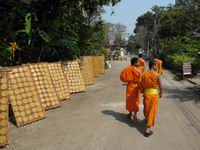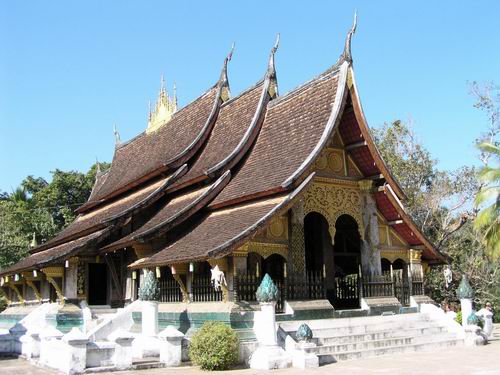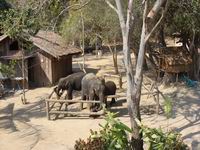|
Laos overview
 Laos
has been known since ancient times as Lan Xang, or Land of the Million
Elephants, and offers visitors a glimpse of old Indochina. It is less
developed than its Chinese, Thai and Vietnamese neighbours, and
traditionally the most reserved, but offers natural beauty and shy
hospitality combined with a mix of original Buddhist culture and French
influences. It also shares its borders with Burma and
Cambodia. Laos
has been known since ancient times as Lan Xang, or Land of the Million
Elephants, and offers visitors a glimpse of old Indochina. It is less
developed than its Chinese, Thai and Vietnamese neighbours, and
traditionally the most reserved, but offers natural beauty and shy
hospitality combined with a mix of original Buddhist culture and French
influences. It also shares its borders with Burma and
Cambodia.
Laos is one of the few Communist countries left in the world. Until
1988, tourists were not allowed access to Laos, but now it is perfectly
feasible to travel all over the country, preferably with a recognised
tour company, although plenty of backpackers do it independently. The
number of tourists is expected to continue increasing over the next few
years as more and more people discover the delights of this laid-back
country of mountains and rivers.

As a mountainous,
landlocked country, situated at the heart of South East Asia, Laos'
lifeline is the Mekong River that flows the length of the country,
providing water for agricultural lands and a major means of
transport.
Vientiane, the unassuming capital, is situated on its
banks, and the city provides a comfortable introduction to the
charms of the country. Laos's most enticing destination is the town
of Luang Prabang, the former royal kingdom, with a legacy of
splendid golden temples and whitewashed houses.
For now, Laos remains relatively isolated and undeveloped. Its
capital, Vientiane, is more like a big village than a crowded Asian
hub and life throughout the country is slow paced. Most people
come
to Laos and make a brief tour of Vientiane and UNESCO World
Heritage-listed
Luang Prabang with perhaps a brief detour to the
mysterious Plain of Jars. But those who make the effort to explore
further afield will be well rewarded with luscious landscapes,
friendly people and unique glimpses of a country hardly changed for
over a century.
A troubled history of French colonisation, internal conflicts and
assertive communism chased much of Laos' population away in the
1970s and isolated the country from the outside world. Today,
though, the doors stand open, and services for travellers are
gradually being
 instituted so that visitors can enjoy an unrivalled
look at the old-fashioned
way of
life of a country still largely unscathed by the harsh effects of
mass tourism. Tourists willing to brave the lack of infrastructure
will discover charming towns and rural villages, smiling, endearing
people, splendid scenery, and a slow, relaxed pace of life. instituted so that visitors can enjoy an unrivalled
look at the old-fashioned
way of
life of a country still largely unscathed by the harsh effects of
mass tourism. Tourists willing to brave the lack of infrastructure
will discover charming towns and rural villages, smiling, endearing
people, splendid scenery, and a slow, relaxed pace of life.
|